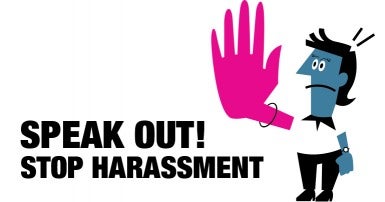 Learn about your rights. Support your co-workers.
Learn about your rights. Support your co-workers.
Harassment is offensive behaviour that a reasonable person would consider unwelcome.
The term “bullying” has several definitions. We use the term “harassment” because it is clearer and stronger. Harassing behaviours could include but are not limited to:
- Spreading malicious rumours, gossip or innuendo.
- Persistently criticizing a person.
- Undermining or deliberately impeding a person’s work.
- Physical threats or abuse.
- Excluding or isolating someone socially.
It can be one serious incident or repeated incidents.
Harassment creates an unhealthy workplace and leads to increased turnover, absenteeism and recruitment problems. It hurts workers and the people we serve.
The person being harassed may be blamed, disbelieved, isolated. They may develop health problems, get injured, lose income or even their job.
What can we do about it?
If you have been harassed:
Learn about your rights
You have the right to work in a harassment-free environment. Harassment is not your fault.
- Find out about harassment policies and complaint procedures at your workplace.
- Read Stop harassment: A guide for CUPE locals.
- Talk to a union steward or someone else you trust.
Keep records
- Write down what happened: places, dates, times, people involved, witnesses and what was said or done.
- Record how the harassment has affected you, including health effects and doctor’s advice.
- Keep evidence such as emails, handwritten notes, photographs, or physical evidence like vandalized personal belongings.
Speak up if you feel safe
- If possible and you feel safe, tell the harasser to stop the behavior. If you want help, a union steward can assist.
- Avoid being alone with the harasser, if possible. Co-workers and your local union can help.
Report the issue
- Talk with your steward about filing a grievance, health and safety or human rights complaint, or taking other action.
If you have witnessed harassment
- Don’t take part in the harassment.
- If you feel safe, tell the harasser to stop the behavior.
- Keep a written record. This information can help in an investigation.
- Support your co-workers who are harassed, and encourage them to come forward.
- Notice the effect of your own behavior on others and be willing to change.
- Ask employer and union representatives to act on harassment, or conditions giving rise to harassment.
Take action to eliminate harassment in your workplace
- Read Stop harassment: A guide for CUPE locals for ideas on what your union can do.
- Talk to your union about harassment.
- Attend CUPE workshops on harassment and human rights.
- Form gay/straight alliances, anti-racism and other solidarity groups to challenge harassment.
- Organize events for the Day of Pink and other anti-harassment campaigns.



